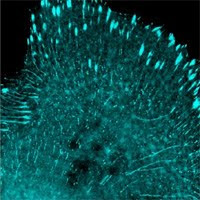AlleleBlog 01/16/2013 San Diego:
Allele
Biotechnology has signed an agreement with Jinan University to develop
culturing systems of stem cells and differentiation methods for
producing skin tissue cells for wound treatment and stem cell therapy.
San
Diego, California (I-Newswire) January 16, 2013 – Allele Biotechnology
and Pharmaceuticals, Inc., a San Diego based company with a focus on new
technology development, announced today that it has signed an agreement
with the Biomedical Institute of Jinan University through a focus group
to develop culturing systems of stem cells and differentiation methods
for producing skin tissue cells for wound treatment. The joint team will
also evaluate using stem cell therapy as potential treatment for
arthritis, Lupus, and other autoimmune-related diseases.
Scientists
from Allele Biotechnology recently described an important advance in
the generation of stem cells capable of producing all the different
tissues of the human body. Using messenger RNA molecules and without the
need of viral vectors, animal products or feeder cells, this new method
can be used to reprogram human fibroblasts into induced pluripotent
stem cells (iPSCs). The efficiency is significantly improved over
previously reported reprogramming results and the time required to
complete reprogramming is slashed in half under optimal conditions.
The
Biomedical Institute at Jinan University, a leading comprehensive
research university in South China, has focused on translational
research in the areas of epidemic diseases and autoimmune diseases. It
has broad collaboration with partners and close connections to the
biotech industry in China. It was known to have launched (licensed) a
number of new biologics in China, and contributed to the understanding
and diagnostics of the SARS epidemic in 2003. The institute has also
been entitled as the national engineering research center of
biopharmaceutics since 2005.
This
collaboration will last for at least 2 years, and will go beyond the
R&D stage with selected candidates moving into clinical trials,
first in China, then in other countries. If the project reaches clinical
trials it will be funded jointly by industry and academic partners in
the range of $10 million USD.




No comments:
Post a Comment